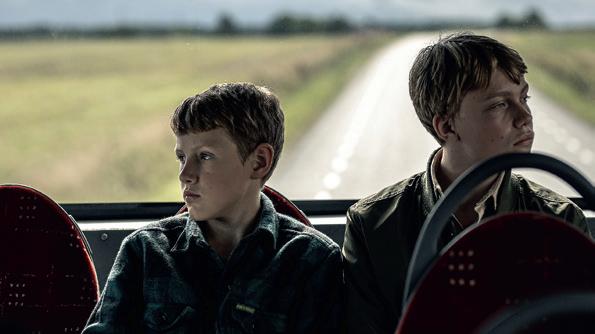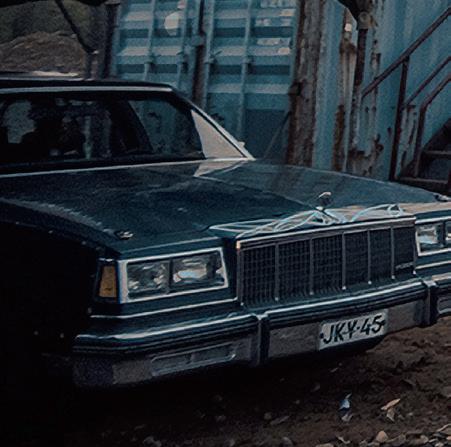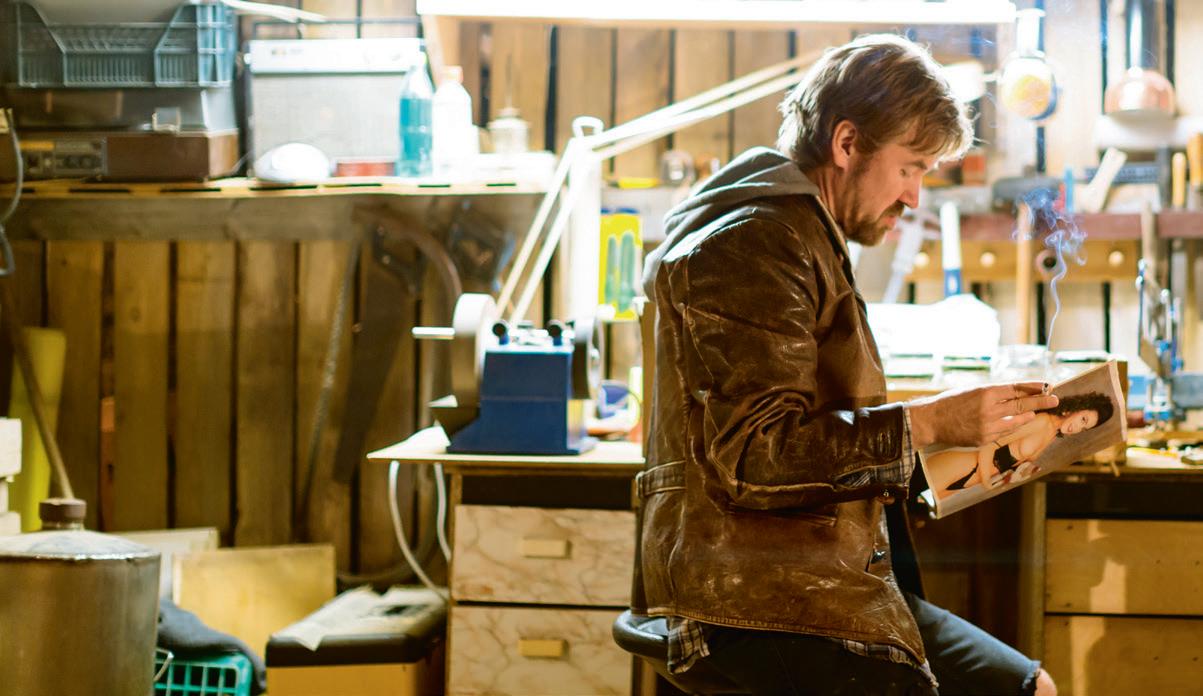
12 minute read
COVER STORY Marju Lepp
Big CATCHING The Fish
Today, Marju Lepp can be called the most diligent film producer in Estonia. Feature On the Water (produced by Marju Lepp, directed by Peeter Simm) premiered in the Main Competition at the Tallinn Black Nights Film Festival, and the film can be also watched in the online market of the Berlin International Film Festival.
By Maria Ulfsak Photos by Viktor Koshkin and Liisabet Valdoja
esides this, she also produced two documentaries last winter; the comedy Estonian Funeral is planned to be premiered in autumn of 2021 (Lepp is one of the producers of the film); and a new feature film is scheduled to start filming in the summer of 2021. Marju is also currently working on several more documentaries and has a feature film in development, directed by German Golub, one of the most promising young talents in Estonian film, who won the Student Academy Award last year.
Let’s start with the feature film On the Water, available in the online market of Berlinale. Please tell us the story behind the film. I can imagine that you as a producer have faced quite a challenge during the filmmaking process – since there are both children who grow up during the filming period as well as the changing seasons. Not to mention that waiting for a snowy winter has become quite an issue during the past few years in Estonia. The beginning of this feature differs from the usual way films have begun for me. It was not the director who came to me with the story but this time it was me who found the story – a novel On the Water by Olavi Ruitlane. The tale was touching – a good, human-centred story about growth, full of diverse characters. I got in touch with the writer, entered into the licence agreement with him and then started to develop the project. Ruitlane himself became the screenwriter. In the beginning the plan was to hire two directors, but we gave up on one and Peeter Simm remained, that was the very best choice. The film did not enter the production phase in the first year, so the child in the role of the protagonist grew too old and we had to choose a new one – Rasmus Ermel. Since the events in the film take place during one year, we decided to use a linear approach to filming. The boy, who is much shorter than the girl in the film, will

Andres, the protagonist of the film, is a sensitive teenager raised by his strict grandparents in a small bland Soviet Estonian town. He is being bullied at school and his only friends are the drunkards, whores and thieves living next door. Among them are a rough but sensible recidivist Valter and the simple-minded fisherman Kolla. And the only way to escape from his worries is to go fishing on the lake... The film talks about boyhood, friendship, first love, loss of loved ones, self-discovery and a coming of age. Despite the brutality and tragedy, it is a warm and humorous story of caring, humanity, and love. On The Water is based on the best-selling novel by Olavi Ruitlane.
noticeably grow during the film – the process of his transformation and growth can be observed on screen. The protagonist and other actors are excellent – everyone’s doing a great job in their performance in the film. The whole team and film crew enjoyed the filming period – there was even a joke going around that there should also be a part two about the protagonist’s adult life. Despite the fact that there are four seasons in the film, we were fortunate with the weather and filming went quite smoothly. The filming in winter brought along some stress – since the last two years there was no proper winter, nor ice, in Estonia. The film crew was on constant standby, and finally the snow came down for three days in March, before the emergency situation due to COVID, and we succeeded in filming the last part.
Collaboration with the director Peeter Simm went really well – he is so creative, always in a good mood and an excellent narrator. With his pleasant stories, Simm managed to keep the film crew and acting team in the right mood during the filming period. The great master can also connect well with both child actors and the experienced ones. New collaboration ideas with Simm are already cooking.
In my opinion, the film came out well, I am satisfied with the final result – a successful combination of a festival film and a film attracting audiences. Estonian journalists have given lots of feedback on the film which also makes me happy.
German Golub is a great young talent of Estonian film – his short film My Dear Corpses has already been successful in the international arena. What kind of project are you developing together? German Golub, who won the Student Academy Award in 2020, is currently working on a film about Erika Salumäe, the Estonian track cyclist who has been twice awarded an Olympic gold medal.
Some time ago I worked as a production manager on the feature film Goodbye Soviet Union (2020, directed by Lauri Randla) and German worked there as an assistant. He stood out immediately, proving to be a young, truly dedicated and diligent person. He was also helping out during the filming of On the Water, being the 3rd AD. We started to talk and it turned out that he had an idea for a short film. When he sent his idea, it was more than clear that there was enough material for a full-length feature film. German is currently

Director Peeter Simm and the main main protagonist of the film, Andres (Rasmus Ermel), on the set of On the Water. working on a screenplay with Mehis Pihla, as well as communicating with Erika Salumäe, the protagonist’s prototype, who currently lives in Spain. The film tells about a great human tragedy – on one hand, it is a story of a girl with a complicated childhood and her self-realization, self-establishment and reaching the top of the sports world; on the other hand, it is a story of looking for love and intimacy.
Please tell us more about your collaboration with cinematographer and director Manfred Vainokivi. You have made numerous films together. One of the recent documentaries, the somewhat scandalous Mephistopheles, premiered at the Baltic Competition programme at the

2020 Black Nights Film Festival and the other one, about the director himself, is in the making right now. We have a long history in producing commercials with Manfred – in 1998, we started with the studio Parunid ja Vonid that we later renamed Filmivabrik, but this field exhausted itself over the years. However, the era taught both the director and the producer an excellent lesson – there was more creative freedom in the field of advertising, twenty years ago, than today. Then we started to make short films and documentaries together. The first one was Valli’s Bar (2008) that was immediately sent to film festivals.
Manfred is rather an experimental, searching filmmaker – he has made traditional films; however, his most original and inventive films such as Stealing Socialism (2014) or In Bed With a Writer (2019) have gained international success and have been included in the main competition programme of IDFA (International Documentary Film Festival Amsterdam) and DOK Leipzig. Mephistopheles that premiered at the end of 2020, talks about Linnar Priimägi, an erudite art historian and lecturer who never says what is appropriate, but always says what he is thinking – and that can sometimes be quite shocking. They have been working together on TV travel shows and at some point Priimägi insisted Manfred make a film about him. The filmmaking process was interesting, just like being on a roller coaster – at some point, Priimägi stated he wouldn’t interfere with the filmmaking; and the next second he already reported that the title of the film must be this or that and directed how the filming should take place. There is also another, deeper level in the
The crew of On the Water working on the set. The film was shot in Southern Estonia.
Manfred Vainokivi is the cinematographer of On the Water. Marju Lepp has worked on many commercials, documentaries and features with him. film – an elderly documentary filmmaker Edvard Oja who comments on the situation from a distance, teaches and cautions the director. The film is definitely giving the viewer a historical portrait. The result is funny, sad, witty and humane.
Manfred’s newest project in the making – Me, an Estonian Director – is an especially experimental documentary. Again, he is searching for new roads and an approach that results in a self-ironic and intriguing work that Manfred himself calls a film-manifesto, and that is supposedly claiming to be an absolute truth.
Our collaboration is creative, of course sometimes we argue a lot and then move on. It is free of routine and boredom.
In June, you should start with the filming of a new feature, this time with Mart Kivastik


who is the screenwriter and director for his story Stairway to Heaven. What is this project about? Mart Kivastik’s tragicomic Stairway to Heaven is a free flight between the 70s and today, a story about setting your spirit free, with an added dimension of the ongoing crisis. The author is looking for an explanation for the time given to us. Is one able to enjoy life, when facing midlife, growing old and eventually dying. The author’s message is humane, derived from his own life experiences: love and happiness from small things make life worth living. I have known Mart for a very long time. He showed me the story and I really liked it, it touched me. We got both the development and production support from the Estonian Film Institute; right now we are making preparations for the filming phase. What is also wonderful, is that the cinematographer for the film is Rein Kotov – and Mart has dreamed of working with him for ages.
Marju Lepp says her heart belongs to film - no matter if she works on a documentary of a feature, as a producer or a production manager. You produce documentaries and feature films, also you help films produced by others as a production manager – but what is it that you enjoy the most? Honestly, I like to make films. The boundary between a documentary and a feature film is often quite vague – at least with the films we have made. Some films come out better than others. You put your heart and soul into every one of them. I am proud of several films we have made. A premiere becomes a success when you feel in the cinema hall that the film really matters to the audience … it is a feeling, a breathing, sometimes emotional tears in the viewers’ eyes, not necessarily any huge applause or loud ovations. According to the grand old master of Estonian film Jüri Sillart, a good film can be compared to a dream – the lights go out and you enter a new world. But the question is whether to enter the dream – or impatiently wait for the lights to go back on.
You studied theatre directing at university. How did you switch to filmmaking? I was in the film class in the upper secondary school where we had to watch films and write about them. Then I studied theatre directing and worked as a methodologist in a cinema, my task was to organize film events for children. Afterwards I got work in the film studio Tallinnfilm where I started to work as an assistant director-clapper girl with my first feature The Trees Were … (1985, directed by Peeter Simm). In this sense we have come all the way and met again… From there, I moved step-by-step towards the place I am today – being a clapper-girl, an assistant, a 1AD, etc.
When I look at the number of films you have produced in 2020 or that are in the making, I have the following question – is it a coincidence or have you have you been working like a lunatic during the past few years? I have to say that I have been really working hard (laughing). Sometimes I have worked to the limits of a burnout. Yet, the fact that several films are produced on a tight schedule is partly due to the pandemic – for instance, the cinema distribution of On the Water has been already postponed three or four times. The comedy Estonian Funeral, where I am one of the producers, was filmed between the two waves of Covid last summer – the film is scheduled to be premiered in late summer 2021. Estonian Funeral is a film for wide audiences and produced with private support; it is based on the successful theatrical play of the same name, written by Andrus Kivirähk.
In collaboration with the director Raimo Jõerand we made a documentary chronicle Year of the Pig – the film tells about the events in Estonia in 2019. It was also the opening film of DocPoint Tallinn 2021. Another documentary with Jõerand is also in the making – telling about the famous cartoonist Gori back in the times of the first Republic of Estonia. The documentary is produced in collaboration with A-Film, since the film includes some animation and we are animating some of the cartoons by Gori – which is again an exciting task! EF
sometimes emotional tears in the viewers’
eyes, not necessarily any huge applause.



Tartu Film Fund supports the shooting and post-production of • international full length feature films • documentaries • short films • animated films • TV series Cash rebate for a single project is up to 20% of eligible expenditure incurred in Tartu or Tartu County.
Tartu Film Fund is managed by the Tartu Centre for Creative Industries Submit your application here tartufilmfund.ee










